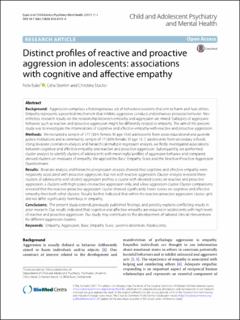Please use this identifier to cite or link to this item:
https://doi.org/10.21256/zhaw-1432Full metadata record
| DC Field | Value | Language |
|---|---|---|
| dc.contributor.author | Euler, Felix | - |
| dc.contributor.author | Steinlin, Célia | - |
| dc.contributor.author | Stadler, Christina | - |
| dc.date.accessioned | 2018-09-12T09:28:05Z | - |
| dc.date.available | 2018-09-12T09:28:05Z | - |
| dc.date.issued | 2017 | - |
| dc.identifier.issn | 1753-2000 | de_CH |
| dc.identifier.uri | https://digitalcollection.zhaw.ch/handle/11475/10450 | - |
| dc.description.abstract | Background: Aggression comprises a heterogeneous set of behavioral patterns that aim to harm and hurt others. Empathy represents a potential mechanism that inhibits aggressive conduct and enhances prosocial behavior. Nevertheless, research results on the relationship between empathy and aggression are mixed. Subtypes of aggressive behavior, such as reactive and proactive aggression might be differently related to empathy. The aim of the present study was to investigate the interrelations of cognitive and affective empathy with reactive and proactive aggression. Methods: We recruited a sample of 177 (33% female, M age 15.6) adolescents from socio-educational and juvenile justice institutions and a community sample of 77 (36% female, M age 13.1) adolescents from secondary schools. Using bivariate correlation analysis and hierarchical multiple regression analysis, we firstly investigated associations between cognitive and affective empathy and reactive and proactive aggression. Subsequently, we performed cluster analysis to identify clusters of adolescents with meaningful profiles of aggressive behavior and compared derived clusters on measures of empathy. We applied the Basic Empathy Scale and the Reactive-Proactive Aggression Questionnaire. Results: Bivariate analysis and hierarchical regression analysis showed that cognitive and affective empathy were negatively associated with proactive aggression, but not with reactive aggression. Cluster-analysis revealed three clusters of adolescents with distinct aggression profiles: a cluster with elevated scores on reactive and proactive aggression, a clusters with high scores on reactive aggression only, and a low aggression cluster. Cluster comparisons revealed that the reactive-proactive aggression cluster showed significantly lower scores on cognitive and affective empathy than both other clusters. Results further indicated that within the reactive-proactive aggression cluster, girls did not differ significantly from boys in empath Conclusions: The present study extends previously published findings, and possibly explains conflicting results in prior research. Our results indicated that cognitive and affective empathy are reduced in adolescents with high levels of reactive and proactive aggression. Our study may contribute to the development of tailored clinical interventions for different aggression clusters. | de_CH |
| dc.language.iso | en | de_CH |
| dc.publisher | BioMed Central | de_CH |
| dc.relation.ispartof | Child and Adolescent Psychiatry and Mental Health | de_CH |
| dc.rights | Licence according to publishing contract | de_CH |
| dc.subject | Juvenile detention | de_CH |
| dc.subject | Aggression | de_CH |
| dc.subject | Adolescents | de_CH |
| dc.subject | Empathy | de_CH |
| dc.subject.ddc | 155: Differentielle Psychologie und Entwicklungspsychologie | de_CH |
| dc.subject.ddc | 362: Gesundheits- und Sozialdienste | de_CH |
| dc.title | Distinct profiles of reactive and proactive aggression in adolescents : associations with cognitive and affective empathy | de_CH |
| dc.type | Beitrag in wissenschaftlicher Zeitschrift | de_CH |
| dcterms.type | Text | de_CH |
| zhaw.departement | Angewandte Psychologie | de_CH |
| zhaw.organisationalunit | Institut für Angewandte Psychologie (IAP) | de_CH |
| dc.identifier.doi | 10.21256/zhaw-1432 | - |
| dc.identifier.doi | 10.1186/s13034-016-0141-4 | de_CH |
| zhaw.funding.eu | No | de_CH |
| zhaw.issue | 1 | de_CH |
| zhaw.originated.zhaw | Yes | de_CH |
| zhaw.publication.status | publishedVersion | de_CH |
| zhaw.volume | 11 | de_CH |
| zhaw.publication.review | Peer review (Publikation) | de_CH |
| Appears in collections: | Publikationen Angewandte Psychologie | |
Files in This Item:
| File | Description | Size | Format | |
|---|---|---|---|---|
| 2017_Steinlin_Distinct_profiles_of_reactive_and_proactive_aggression_in_adolescents.pdf | 1.01 MB | Adobe PDF |  View/Open |
Show simple item record
Euler, F., Steinlin, C., & Stadler, C. (2017). Distinct profiles of reactive and proactive aggression in adolescents : associations with cognitive and affective empathy. Child and Adolescent Psychiatry and Mental Health, 11(1). https://doi.org/10.21256/zhaw-1432
Euler, F., Steinlin, C. and Stadler, C. (2017) ‘Distinct profiles of reactive and proactive aggression in adolescents : associations with cognitive and affective empathy’, Child and Adolescent Psychiatry and Mental Health, 11(1). Available at: https://doi.org/10.21256/zhaw-1432.
F. Euler, C. Steinlin, and C. Stadler, “Distinct profiles of reactive and proactive aggression in adolescents : associations with cognitive and affective empathy,” Child and Adolescent Psychiatry and Mental Health, vol. 11, no. 1, 2017, doi: 10.21256/zhaw-1432.
EULER, Felix, Célia STEINLIN und Christina STADLER, 2017. Distinct profiles of reactive and proactive aggression in adolescents : associations with cognitive and affective empathy. Child and Adolescent Psychiatry and Mental Health. 2017. Bd. 11, Nr. 1. DOI 10.21256/zhaw-1432
Euler, Felix, Célia Steinlin, and Christina Stadler. 2017. “Distinct Profiles of Reactive and Proactive Aggression in Adolescents : Associations with Cognitive and Affective Empathy.” Child and Adolescent Psychiatry and Mental Health 11 (1). https://doi.org/10.21256/zhaw-1432.
Euler, Felix, et al. “Distinct Profiles of Reactive and Proactive Aggression in Adolescents : Associations with Cognitive and Affective Empathy.” Child and Adolescent Psychiatry and Mental Health, vol. 11, no. 1, 2017, https://doi.org/10.21256/zhaw-1432.
Items in DSpace are protected by copyright, with all rights reserved, unless otherwise indicated.